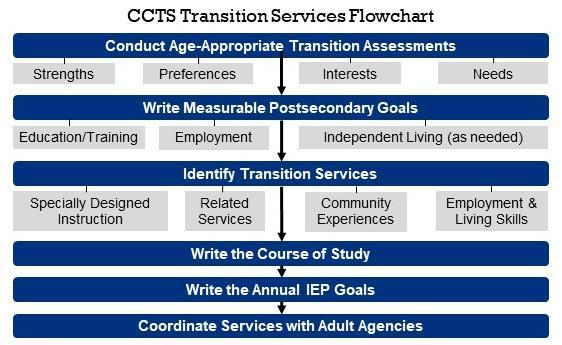Transition Planning Resources
Tools, resources, and materials designed for Washington state educators, administrators, agency staff, youth with disabilities, and families/caregivers
Transition Services Flowchart
The CCTS Transition Services Flowchart describes the intentional flow of the Indicator B13 transition components. These components include age-appropriate transition assessments, writing postsecondary and annual goals, identifying transition services, writing the course of study, and coordinating services with adult agencies.
Additional Resources from CCTS
T-Folio Curriculum
T-Folio is a free online transition portfolio tool for high school-age youth with disabilities. The curriculum aligns with Individual Education Program (IEP) transition planning, DVR Pre-Employment Transition Service categories, and the CCTS Transition Services Flowchart. Many activities also align with the High School and Beyond Plan required for all students for graduation.
Transition Foundations Training
CCTS offers self-paced, online training courses that highlight best practices in secondary transition. Courses are designed for educators, agencies, and families/caregivers.
Inclusionary Practices Training
This free, self-paced training course focuses on inclusionary practices and partnerships between Special Education (SE) and Career Technical Education (CTE).
Post-School Outcome Data
Post-School Outcome (PSO) data provide insights into education and employment activities for students with disabilities. School districts can use PSO data to evaluate the effectiveness of their special education programs.
Quality Indicators for Secondary Transition (QuIST)
The QuIST is a free program improvement tool developed by CCTS. It enables school district teams to self-evaluate their transition services for students with disabilities in five domains: School-Based Activities, Work-Based Learning, System Support, Family Involvement, and Agency Connections. It is not used for compliance monitoring. Districts can complete the QuIST using an Excel workbook that autocalculate the results and displays them on a summary scoresheet.
Resources from OSPI
OSPI's Indicator B13 Checklist/Transition File Review
The Indicator B13 Checklist/Transition File Review, developed by OSPI and aligned with the National Technical Assistance Center on Transition: The Collaborative (NTACT:C) checklist, is a tool for reviewing IEPs for compliance with Indicator B13 requirements.
Transition Supports and Services Summary for Students, Families & Caregivers
Co-developed with CCTS, the purpose of this resource is to support students and families to learn more about how the Individualized Education Program (IEP) Transition Plan and aligned High School and Beyond Plan (HSBP) support a student to be ready for their goals for post-secondary goals.
Tips from the Special Education Division: Secondary Transition Services and Supports
This document from April 2023 addresses important information to know about secondary transition services and supports, including individualized decisions about a student’s graduation date and plan, reminders for secondary transition services and supports for students between 16-21, best practices for IEP transition plans and transition services, secondary transition resources, and transition recovery services.
Guidelines for Aligning High School & Beyond Plans (HSBP) and IEP Transition Plans
The purpose of this document is to provide general information and guidelines to P-12 educators, staff, and administrators for developing and aligning the HSBP and the IEP, including suggestions for minimizing duplication.
Graduation Resources
To graduate from high school in Washington state, at a minimum students must earn the required credits, and complete both a Graduation Pathway and a High School and Beyond Plan. The resources on this OSPI web page are designed for school support staff, educators, school districts, and families to help students graduate with a diploma and a plan for a meaningful first step after high school.
